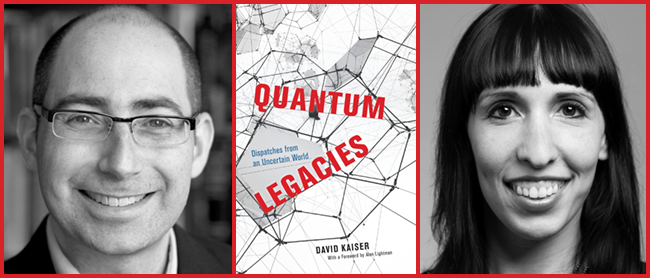Date:
Date:
| Where | Online: https://www.harvard.com/event/virtual_event_david_i._kaiser/ |
| When | June 7, 2022 @6:00PM |
| Organization/Sponsor | Harvard Division of Science, Harvard Library, and Harvard Book Store |
| Speaker(s) | David Kaiser and Amanda Gefter |
| Cost | free |
| Contact Info | science_lectures@fas.harvard.edu |

The ideas at the root of quantum theory remain stubbornly, famously bizarre: a solid world reduced to puffs of probability; particles that tunnel through walls; cats suspended in zombielike states, neither alive nor dead; and twinned particles that share entangled fates. For more than a century, physicists have grappled with these conceptual uncertainties while enmeshed in the larger uncertainties of the social and political worlds around them, a time pocked by the rise of fascism, cataclysmic world wars, and a new nuclear age.
In Quantum Legacies, David Kaiser introduces readers to iconic episodes in physicists’ still-unfolding quest to understand space, time, and matter at their most fundamental. In a series of vibrant essays, Kaiser takes us inside moments of discovery and debate among the great minds of the era—Albert Einstein, Erwin Schrödinger, Stephen Hawking, and many more who have indelibly shaped our understanding of nature—as they have tried to make sense of a messy world.
Ranging across space and time, the episodes span the heady 1920s, the dark days of the 1930s, the turbulence of the Cold War, and the peculiar political realities that followed. In those eras as in our own, researchers’ ambition has often been to transcend the vagaries of here and now, to contribute lasting insights into how the world works that might reach beyond a given researcher’s limited view. In this new book, Kaiser unveils the difficult and unsteady work required to forge some shared understanding between individuals and across generations, and in doing so, he illuminates the deep ties between scientific exploration and the human condition.
_____________________________________________________________________
David Kaiser is Germeshausen Professor of the History of Science and Professor of Physics at the Massachusetts Institute of Technology. He is the author of several award-winning books about modern physics, including Drawing Theories Apart: The Dispersion of Feynman Diagrams in Postwar Physics, which traces how Richard Feynman’s idiosyncratic approach to quantum theory became mainstream; and How the Hippies Saved Physics: Science, Counterculture, and the Quantum Revival, which focuses on physicists’ efforts to understand strange phenomena like quantum entanglement. A Fellow of the American Physical Society, Kaiser has received MIT’s highest awards for excellence in teaching. His work has been featured in Science, Nature, the New Yorker magazine, and the New York Times. His group’s recent efforts to conduct a “Cosmic Bell” test of quantum entanglement were featured in the documentary film, Einstein’s Quantum Riddle.
Amanda Gefter is a freelance writer specializing in fundamental physics, cosmology, cognitive science and philosophy, and author of the book Trespassing on Einstein's Lawn. Her writing has been featured in the New York Times, The Atlantic, Nautilus, Nature, Scientific American, Quanta, the Philadelphia Inquirer, and New Scientist magazine, where she previously served as Books & Arts editor. She also co-host BookLab, a podcast about popular science books, with science journalist Dan Falk.
For more information and videos of Harvard Science Book Talks, see https://science.fas.harvard.edu/book-talks.